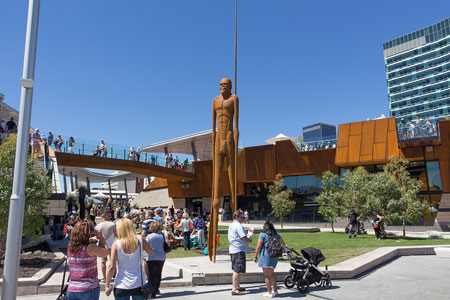City of Cockburn Indonesian Translation Services
Perth Translation Services » Perth » City of Cockburn Translation Services » City of Cockburn Indonesian Translation Service
City of Cockburn Indonesian Translation Services
Get fast and professional translation services in City of Cockburn. Our Indonesian translators provide translation of all types of documents. These include confidential legal, financial and migration document translations.
Upload Document For Translation

City of Cockburn
The City of Cockburn is a local government area in the southern suburbs of the Western Australian capital city of Perth about 8 kilometres (5 mi) south of Fremantle and about 24 kilometres (15 mi) south of Perth's central business district. The City covers an area of 167.5 square kilometres (64.7 sq mi) and had a population of over 104,000 as at the 2016 Census.
City of Cockburn History
Cockburn is named after Cockburn Sound, which was named in 1827 by Captain James Stirling after Admiral Sir George Cockburn. Sir George was born in London in 1772 and was a renowned British naval officer, eventually becoming Admiral of the Fleet and First Sea Lord. He served under Horatio Nelson during the war with France, but came to public attention and was granted his knighthood for his service in the War of 1812, in particular for the burning of Washington in 1814. It was he who took Napoleon to exile on the island of Saint Helena after the Battle of Waterloo in 1815.
In 1871, the Fremantle Road District was created under the District Roads Act 1871 to cover the area to the south and east of Fremantle, and the Fremantle Road Board was created to manage it. The original District was bounded on the north by the Swan River from Fremantle to the mouth of the Canning River; on the east by a line from Bull Creek to the junction of what is now the intersection of the Albany and South Western Highways in Armadale; on the south by a line from Armadale to, and including the Rockingham townsite; and to the west by the Indian Ocean.
City of Cockburn Suburbs
Atwell, Aubin Grove, Banjup, Beeliar, Bibra Lake, Cockburn Central, Coogee, Coolbellup, Hamilton Hill, Hammond Park, Henderson, Jandakot, Leeming, Munster, North Coogee, North Lake, Rottnest Island, South Lake, Spearwood, Success, Treeby, Wattleup, YangebupAbout the Indonesian Language
Indonesian is the official language of Indonesia. It is a standardized register of Malay, an Austronesian language that has been used as a lingua franca in the multilingual Indonesian archipelago for centuries. Indonesia is the fourth most populous nation in the world. Indonesian is one of the most widely spoken languages in the world.
Most Indonesians, aside from speaking the national language, are fluent in any of more than 700 indigenous local languages; examples include Javanese, Sundanese and Balinese, which are commonly used at home.
The nationalist movement that ultimately brought Indonesian to its national language status rejected Dutch from the outset. However, the rapid disappearance of Dutch was a very unusual case compared with other colonized countries, where the colonial language generally has continued to function as the language of politics, bureaucracy, education, technology, and other important areas for a significant time after independence. Soenjono Dardjowidjojo even goes so far as to say that "Indonesian is perhaps the only language that has achieved the status of a national language in its true sense" since it truly dominates in all spheres of Indonesian society. The ease with which Indonesia eliminated the language of its former colonial power can perhaps be explained as much by Dutch policy as by Indonesian nationalism, though. In marked contrast to the French, Spanish and Portuguese, who pursued an assimilation colonial policy, or even the British, the Dutch did not attempt to spread their language among the indigenous population. In fact, they consciously prevented the language from being spread by refusing to provide education, especially in Dutch, to the native Indonesians so they would not come to see themselves as equals. Moreover, the Dutch wished to prevent the Indonesians from elevating their perceived social status by taking on elements of Dutch culture. Thus, until the 1930s, they maintained a minimalist regime and allowed Malay to spread quickly throughout the archipelago.
Dutch dominance at that time covered nearly all aspects, with official forums requiring the use of Dutch, although since the Youth Congress (1928) the use of Indonesian as the national language was agreed on as one of the tools in the pro-independence struggle. As of it, Mohammad Hoesni Thamrin inveighed actions underestimating Indonesian. After some criticism and protests, the use of Indonesian was allowed since the Volksraad sessions held in July 1938. By the time they tried to counter the spread of Malay by teaching Dutch to the natives, it was too late, and in 1942, the Japanese conquered Indonesia and outlawed the use of the Dutch language. Three years later, the Indonesians themselves formally abolished the language and established Bahasa Indonesia as the national language of the new nation.
City of Cockburn Indonesian Translator Services
Indonesian translator for certified translation services:
- Indonesian driving license translation
- Indonesian financial translation and bank statement translations
- Indonesian birth certificate translation
- Indonesian marriage certificate translation
- Indonesian name-change certificate translation
- Indonesian degree translation
- Indonesian diploma translation
- Indonesian school transcript translation
- Indonesian passport translation
- Indonesian police report translation
- Indonesian police check translation
- Indonesian personal letters and cards
- Indonesian utility bill translations
- Indonesian death certificate translation
Perth Translation provides fast and affordable Indonesian translation services in the City of Cockburn for all types of personal documents by NAATI translators.
Languages Translated
- Arabic translation service
- Czech translation service
- Chinese translation service
- Croatian translation service
- Danish translation service
- Dutch translation service
- French translation service
- Finnish translation service
- Greek translation service

